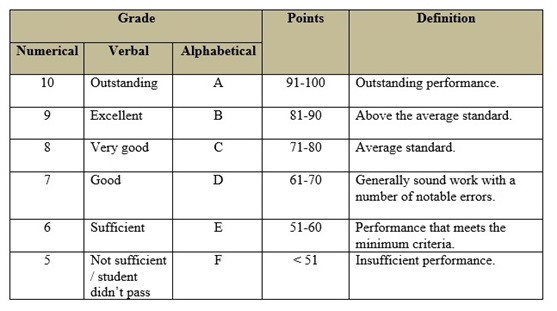ECTS Information
ECTS is the European Credit Transfer and Accumulation System which is a standard for comparing the study attainment and performance of students of a higher education (for this section, see ECTS Users' Guide, Annex 2).
Following the Bologna Declaration, Faculty of Business Economics and Entrepreneurship has adopted the ECTS for all levels of study, in order to facilitate student mobility at international level and to provide transparency and recognition of its study programs. The aims of ECTS are to facilitate student mobility at international level; to ensure the transparency that would provide higher education institutions with additional information about student performance; to ensure that periods of study abroad are recognized in the students’ home country; and to provide model rules of application based on the transparency of the study programs and the success of the students to regulate academic recognition (Application and recognition of ECTS).
ECTS credits express the volume of learning based on the defined learning outcomes and their associated workload. Total of 60 ECTS credits is allocated to the learning outcomes and associated workload of a full-time academic year, which normally comprises a number of educational components to which credit (on the basis of the learning outcomes and workload) are allocated. At the Faculty of Business Economics and Entrepreneurship, ECTS credits are expressed in whole numbers.
European Credit Transfer and Accumulation System is based on the principle of transparency of learning, teaching and assessment process. Its objective is to facilitate planning, delivery, and evaluation of study programs and student mobility by recognizing learning achievements and qualifications and periods of learning. The Catalogue Course includes information on ECTS credits allocated to different courses.
According to Serbian Law on Higher Education. Academic credit system in Serbia and at Faculty of Business Economics and Entrepreneurship is as follows:
Bachelor academic study programs carry:
Business economy and entrepreneurship minimum of 180 ECTS.
Economy, Finance and Insurance minimum of 240 ECTS.
Law minimum of 240 ECTS.
Master academic studies carry:
Business economy and entrepreneurship minimum of 120 ECTS credits (where a total of 180 ECTS credits have been previously earned during the bachelor academic studies).
Economy, Finance and Insurance minimum of 60 ECTS credits (where a total of 240 ECTS credits have been previously earned during the bachelor academic studies).
Each course within a study program or short program is assigned a corresponding number of ECTS credits, while the scope of the study is expressed by aggregate ECTS credits.
A total ECTS credits corresponds to an average total input of a student of a 40-hour work week during an academic year. Overall activities of a student include active teaching courses (lectures, exercises, seminars, etc.), autonomous work, preliminary exams (colloquia), exams, writing final papers, voluntary work in a local community and other forms of involvement.
The academic year at the Faculty of Business Economics and Entrepreneurship is divided into a Winter and a Summer semester. Each semester consists of 15 weeks of teaching and of exam periods defined by academic calendar adopted for each academic year. Methods of assessment are based on written and oral examinations, coursework and assignments.
GUIDELINE AND PROCEDURE FOR ORGANIZING MOBILITY OF STUDENTS
Basic documents that are enabling mobility of students on master studies, as well as transfer and recognition of ECTS credits that are gained on other higher education institutions, are:
- Student application form
- Learning Agreement
- Transcript of records
Procedure for organizing mobility of Faculty of Business Economics and Entrepreneurship (VSPEP) students is done in the following way:
FIRST STEP – COMPETITION, SELECTION AND MOBILITY AGREEMENT
Students can apply for different Programs of Mobility, which are approved by our Faculty, at other foreign universities and institutions with which BEE has signed bilateral cooperation agreements.
SECOND STEP – RECOGNITION OF ECTS POINTS
After official acceptance comes from the host university/faculty (through written confirmation of acceptance), students will sign Learning Agreement that states the subjects that the students choose and pass exams at the host university during mobility program.
Recognition of ECTS points is only referred to Erasmus+ program.
Basic document that will enable recognition and transcript of ECTS points that are acquired at other higher education institution are:
- Learning Agreement
- Transcript of Records
Recognition of exams and transcript of ECTS is done according to the Learning Agreement and Transcript of records certified by the host institution. Recognition of descriptive grade from the host institution is done according to the system of grading defined by Serbian law for higher education and it is given on the next page of this document.


